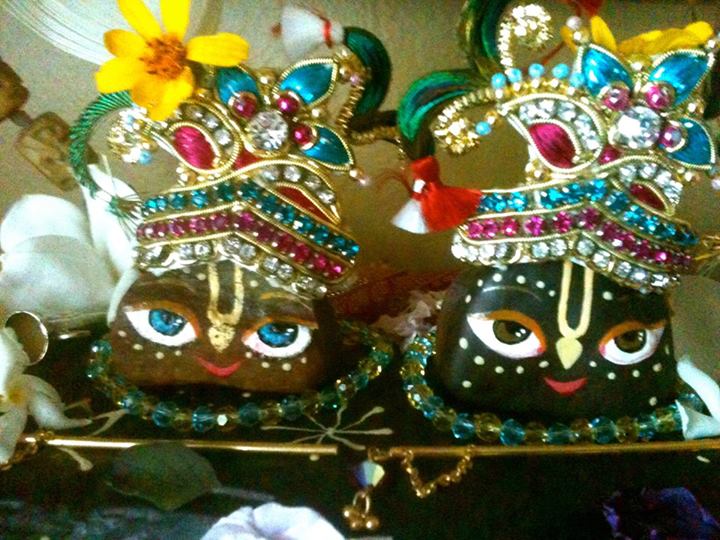last updated 1st August 2011

Sri Sri Krishna Balaram

Sri Sri Krishna Balaram
Sanskrit Scholar Gopiparanadhana Dasa Passes Away
By: Madhava Smullen on Sept. 16, 2011
http://news.iskcon.org/sanskrit-scholar-gopiparanadhana-dasa-passes-away,2867/
To the shock and sadness of the entire ISKCON community around the world, Sanskrit scholar, teacher, and author Gopiparanadhana Dasa passed away unexpectedly sometime between 4:30am and 6:00am on Thursday September 15th (2011) at his home in Govardhana, India, where he lived with his wife and son.
Although no official information had been given as to the cause of death by the time of this report, his friend ISKCON guru Bhakti Charu Swami said it was most likely due to lack of oxygen during an intense asthma attack—something he had suffered from since childhood.
According to reports from ISKCON Govardhana, Gopiparanadhana would chant the Hare Krishna mantra on his beads early every morning, and then offer puja. On the morning of his passing, he was seen carrying out his duties and appeared to be “fine.” At 9:00am, however, a devotee who had been waiting an hour to see him was concerned and checked on him to find that he had passed away.
“His body was prostrate on the floor of his room,” said Srutakirti Dasa, a disciple of Srila Prabhupada who was in nearby Vrindavana at the time. “He was lying on his back, with his left side facing the sacred Govardhan Hill. I was his first Godbrother in the room, and after a few minutes I began to chant the Nrsimha prayers.”
At the time of his passing, Gopiparanadhana had just returned from Indradyumna Swami’s festival tour in Poland, and had been scheduled to leave for China in two days. But in the interim, he had returned to Govardhana, where he taught at the Srimad-Bhagavat-Vidyapitham, a Sanskrit Language school backed by the Bhaktivedanta Book Trust (BBT).
“Krishna arranged for him to leave his body in this sacred town,” Srutakirti said.
It’s no surprise that Gopiparanadhana should have such an auspicious passing, for his devotion and service in the Hare Krishna movement was truly exemplary.
Born in 1950 in New York City, he received his BA in linguistics from Columbia University in 1972 and was initiated by Srila Prabhupada in 1973. Under Prabhupada’s guidance, he developed an expertise in Sanskrit and served as an editor for the BBT.
After Srila Prabhupada passed away in 1977, Gopiparanadhana helped complete his guru’s masterwork the Srimad Bhagavatam, as well as the Vaishnava scriptures Mukunda-mala-stotra and Narada-bhakti-sutra.
Later, he continued to translate and comment upon Gaudiya-Vaishnava literature, beloved amongst the devotee community for giving them such sweet and enlightening devotional works as Sanatana Goswami’s Krishna-lila Stava, a personal meditation of Krishna’s Vrindavana pastimes.
His crowning achievement in this field may have been his translation of the three-volume Brihad-Bhagavatamrita, also by Sanatana Goswami, in which we follow the devotee Gopa Kumara on his epic journey to Krishna’s abode of Goloka Vrindavana, as he reaches higher and higher levels of love for the Lord.
In 2005, Gopiparanadhana established the Srimad-Bhagavat Vidyapitham, where he trained prospective Sanskrit translators and editors for the BBT. As well as teaching his students Sanskrit grammar, spoken Sanskrit, and Kavi Karnapura’s science of poetry, he also trained them to develop high levels of bhakti and brahminical qualities.
Although he travelled around the world somewhat to teach Krishna consciousness, he spent most of his time in his later years at Govardhana with his wife, his son, and their two cows.
Perhaps the greatest hint as to Gopiparanadhana’s personal conduct, nature and inner spiritual focus comes from a framed picture that he kept on his desk in those later days. It read:
“Do not hear from the mouths of persons lacking proper conduct. If your conduct is below par, you should not publicly preach about the Lord. Close the door and preach to yourself. Bhajan really begins when one’s outside and inside are the same.”
According to ISKCON guru Lokanatha Swami, Gopiparanadhana’s funeral service was observed on the same day as his passing, starting at 3 o’clock in the afternoon.
“His body was bathed, arati was offered to him, and he was carried in a kirtan procession along the Govardhana pilgrimage path, past Manasi-Ganga, to the cremation site,” the Swami said. “Along the way, many local residents stepped out of their shops or homes to offer their respects. When we arrived, we lay his body down on sacred cow dung patties from the cows of Vraja and covered him with them. His teenage son was the first to light the funeral fire. Then the 100 devotees present circumambulated the fire, as a gentle breeze blew in from Kusum Sarovar.”
At 8:00am on September 16th, the day after Gopiparanadhana’s passing, many devotees gathered at the Krishna Balarama Mandir in Vrindavana to remember and glorify the great soul, after which a feast was shared in his honor.
As disclosed in his will, Gopiparanadhana Dasa’s ashes will be placed in Samadhi at the foot of Govardhana Hill, right across from ISKCON Govardhana and next to the Pushpa Samadhi of his Godbrother Padmalochan Dasa.
“He was such a wonderful Vaishnava, dear to all who knew him, and so wonderfully adept in communicating the teachings of our acharyas and helping to preserve their legacy by establishing his Sanskrit school at Govardhana,” said fellow ISKCON scholar Krishna-Ksetra Dasa. “He did so much in the way of demonstrating the highest standard of devotional scholarship and scholarly devotion, that he will long be remembered and referred to by aspiring Sanskritists.”
ISKCON guru Hridayananda Dasa Goswami, meanwhile, said, “We worked together for several years to finish Srila Prabhupada's Bhagavatam, and in this and other projects, he showed his brilliant, faithful understanding of Vaishnava literature. His personal life, as we know, was exemplary and saintly. I want to express my sincere condolences to all of his family and friends.”

Search here for individual Sevaks and Deities World-wide.
A-B-C-D-E-F-G-H-I-J-K-L-M-N-O-P-Q-R-S-T-U-V-W-X-Y-Z

